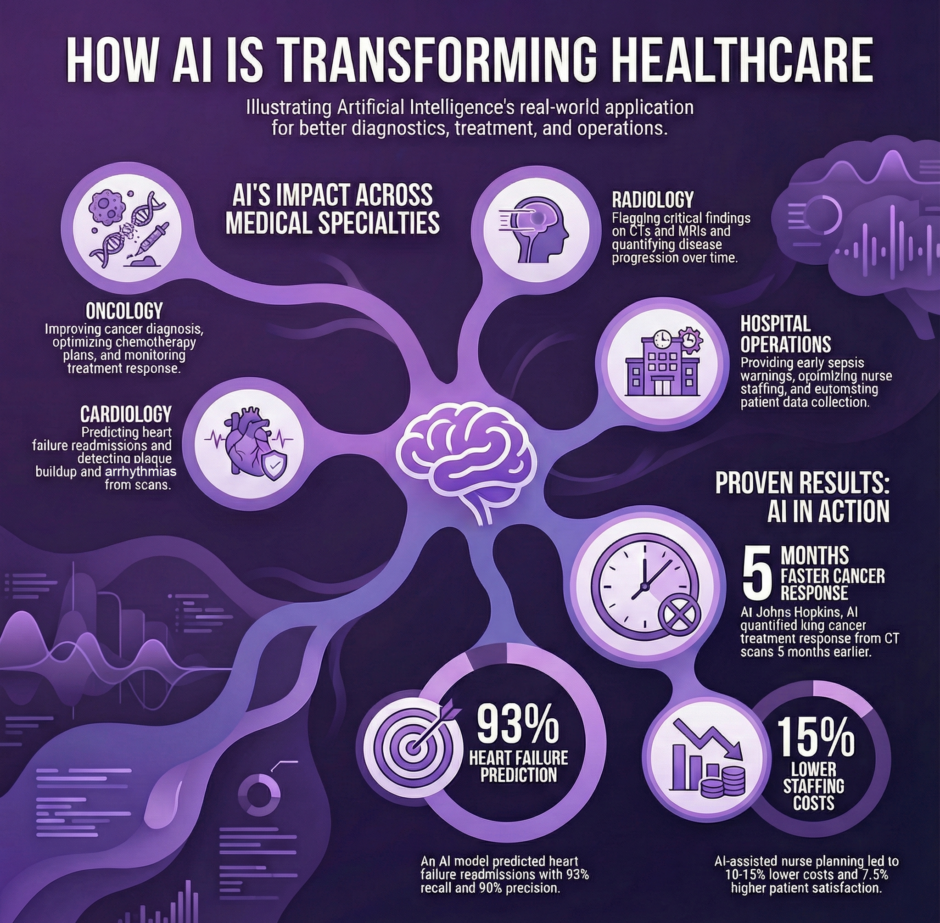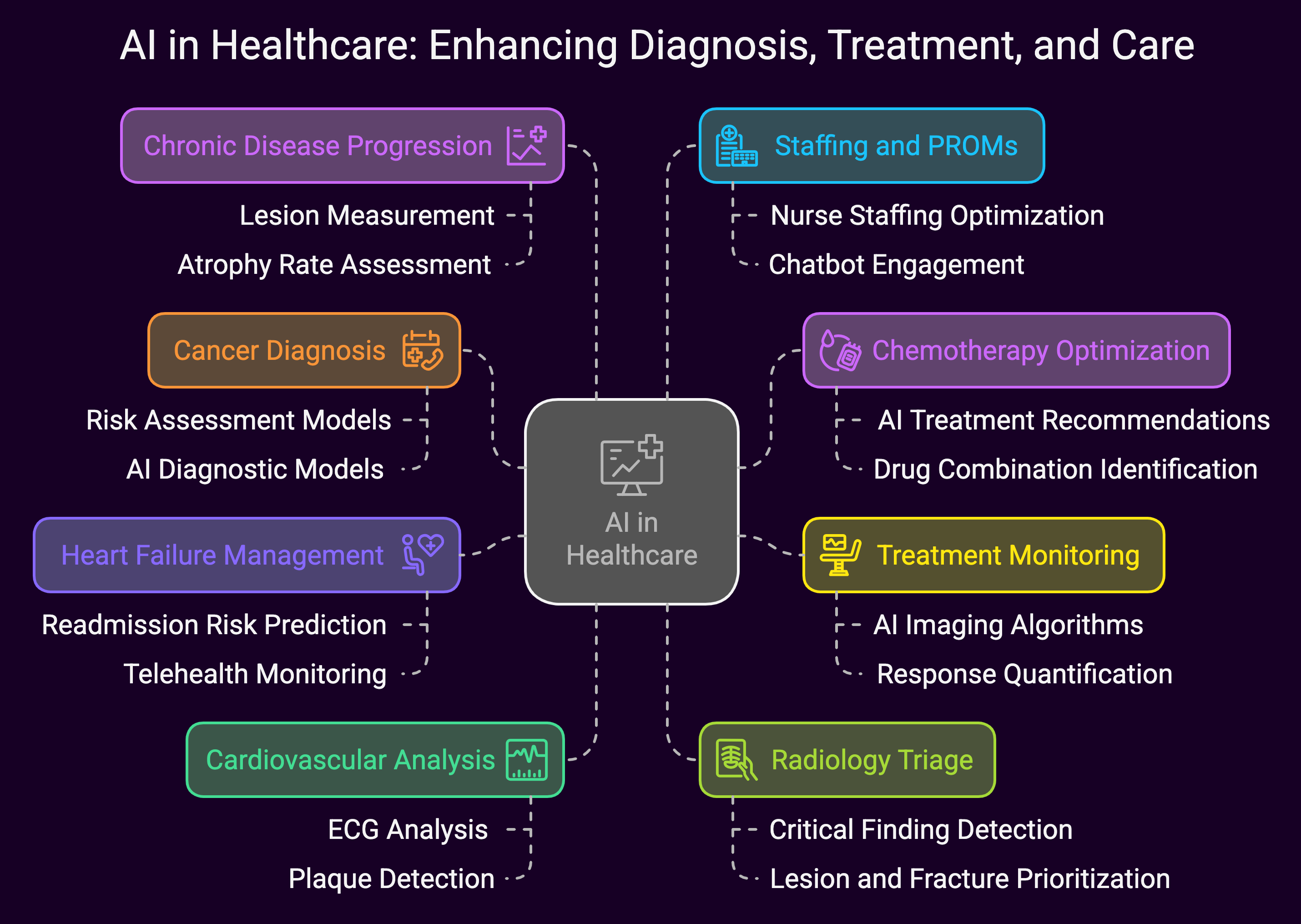Artificial intelligence has moved from hype to mainstream adoption across healthcare, unlocking new possibilities for improving patient outcomes, experiences, and access to care.
 Below, we’ll explore 12 impactful real-world use cases showing exactly how healthcare providers are leveraging different AI models to enhance clinical workflows, augment decision making, streamline operational processes, and advance precision medicine.
Below, we’ll explore 12 impactful real-world use cases showing exactly how healthcare providers are leveraging different AI models to enhance clinical workflows, augment decision making, streamline operational processes, and advance precision medicine.
We’ll examine practical AI applications in specialties ranging from oncology to cardiology to radiology and beyond. The tangible examples demonstrate how doctors can incorporate algorithmic insights to drive quality, safety, efficiency, and revenue. Statistics and tangible results will reveal the measurable impact attained by health systems employing AI-powered solutions.
By the end of this extensive resource, you will have clear understanding of:
- The categories of AI improving patient care and provider performance
- 12 applied use cases of AI models aiding clinical specialties
- How leading health systems are already achieving outcomes using AI
- The measurable clinical, financial, and operational results attained
- Practical steps to identify and implement ethical, effective AI technology
This detailed evidence quantifies how AI is transitioning from promise to practical tools delivering better care for patients and providers.
How AI is Transforming Healthcare Delivery
Applied AI has stepped to the forefront of digital health innovation, but discussions often remain too theoretical. Examining how real healthcare organizations employ AI models across critical use cases, allows us to move past the hype to quantify real-world enhancements.

AI solutions are commonly grouped into three capability categories improving care delivery:
- Clinical Decision Support: AI can analyze patient information against scientific literature, care guidelines, and treatment history to suggest diagnostic and therapeutic options for specific individuals. This augments clinician knowledge.
- Operational Analytics: Algorithms study complex system, cost, risk, and outcomes data to pinpoint opportunities to intervene upon organizational performance gaps and inefficiencies.
- Workflow Enhancement: Automating repetitive administrative and documentation tasks allows clinicians to focus on higher-value patient care activities.
Let’s explore 12 use cases demonstrating AI applicability across prominent medical specialties:
Oncology Use Cases
- Risk Assessment Models for Cancer Diagnosis
- Optimizing Chemotherapy Treatment Plans
- Monitoring Oncology Treatment Response
Cardiology Use Cases
- Congestive Heart Failure Readmission Risk Prediction
- ECG Analysis Algorithms to Detect Arrhythmias
- CT Image Processing for Plaque Detection
Radiology Use Cases
- Flagging Critical Findings in Imaging Reports
- Quantifying Disease Progression Through Imaging Pattern Recognition
- Automating Follow-up Recommendations from Radiology Reports
Additional AI Applications
- Sepsis Early Warning and Risk Scoring Systems
- Optimizing Hospital Nursing Staff Models
- Automating Patient-Reported Outcome Collection
12 Real-World Healthcare Use Cases of AI
 Let’s explore examples of doctors and health systems seeing success with AI adoption:
Let’s explore examples of doctors and health systems seeing success with AI adoption:
Use Case #1: Risk Assessment Models for Cancer Diagnosis
Cancer takes heavy tolls worldwide, with breast cancer impacting over 250,000 U.S. women annually at a cost of $20 billion. Mammograms serve as a key screening tool but limited radiologist time and expertise constrain oversight. AI-enabled risk assessment models help improve early diagnosis rates to get patients proper treatment sooner.
Results from Health Systems Using AI Diagnostic Models:
- Miami Cancer Institute: Computer vision model analyzing mammogram images increased positive predictive value in diagnosing malignancies by 10% compared to clinicians.
- Sweden’s Karolinska Institute: AI model improved breast cancer risk discrimination by 22% over traditional models by incorporating full patient history data.
- Owkin and NYU School of Medicine: Algorithm analyzing mammogram images predicted risk scores for breast cancer onset up to 5 years prior to diagnosis.
By processing more data points than humanly possible, AI algorithms uncover early signals that advance life-saving diagnosis and interventions for breast cancer patients.
Use Case #2: Optimizing Chemotherapy Treatment Plans
Oncologists rely on imprecise methods to design chemotherapy regimens, leading to suboptimal medication choices. AI models that assess clinical data, genomic biomarkers, and population outcomes help determine optimal treatment plans for patients.
Results from Health Systems Using Oncology AI Models:
- University of North Carolina Lineberger Cancer Center: AI treatment recommendations aligned with oncologist choices in 97% of rectal cancer cases and 95% of bladder cases, improving consistency.
- Dayton Children’s Hospital: AI model predicted pediatric leukemia patients’ responses to chemotherapy drugs with 92% accuracy to inform care paths.
- Raghu AI and UCSF: Algorithm analyzing past treatment response data identified more effective drug combinations for breast cancer patients.
By predicting optimal medication regimens for patients, AI chemotherapy models enhance consistency in treatment planning while minimizing trial-and-error gaps that delay care.
Use Case #3: Monitoring Oncology Treatment Response
Cancer treatment plans require frequent adjustment, but quantifying how patients respond to interventions remains challenging. AI imaging algorithms track meaningful changes in tumors over the course of therapy to determine next steps.
Outcomes from Health Systems Employing AI Treatment Response Monitoring:
- Johns Hopkins University: Machine learning quantified lung cancer treatment response from CT scans 5 months earlier than traditional clinical criteria.
- Phathom Analytics and UPMC: AI platform assessed liver lesions over time with 95% accuracy to inform oncology care adjustments.
- Qure AI and UPMC: Algorithm that autogenerated radiology report impressions improved oncologist productivity by 20%.
Automated insights speed critical decision making to enhance cancer care while increasing clinician efficiency.
Use Case #4: Congestive Heart Failure Readmission Risk Prediction
Hospital readmissions for heart failure require preventive intervention, but stretched cardiology teams struggle predicting who is most at risk. AI algorithms parse clinical and social factors to identify patients prone to bouncing back.
Results with AI Readmission Risk Scoring:
- Purposeful AI and Parkland Center for Clinical Innovation: Machine learning model predicted heart failure readmissions within 30 days with 93% recall and 90% precision.
- Johannes Gutenberg University: Neural network using EMR data autonomously identified of 84% heart failure patients at high readmission risk.
- Cleveland Clinic: Natural language processing of cardiology notes boosted readmission risk prediction accuracy by 12% over conventional methods.
Pinpointing high-probability readmission patients allows targeting of services like telehealth monitoring to promote intervention before avoidable rehospitalization.
Use Case #5: ECG Analysis Algorithms to Detect Arrhythmias
Cardiologists interpreting ECG readings look for arrhythmias indicating cardiac issues. But even specialists can overlook subtle patterns in lengthy printouts. AI ECG analysis serves as a validation system to catch potential abnormalities.
Results from AI-Assisted ECG Analysis:
- Mayo Clinic: AI detected 10 types of arrhythmia on ECGs with accuracy matching cardiologists, serving as decision support.
- Cambridge Heart: Machine learning algorithms spotted irregular heart rhythms from wearable data that preceded debilitating strokes.
- Stanford Medicine: AI model diagnosed pediatric heart arrhythmias on ECGs with 93% accuracy, far faster than manual review.
AI augments clinicians’ ECG analysis to catch early symptoms of serious heart conditions requiring intervention.
Use Case #6: CT Image Processing to Identify Plaque Buildup
Calcified plaque accumulation in arteries can lead to heart attacks and stroke if untreated. But visually inspecting cardiac CT angiogram images for early signs is tedious. AI plaque detection algorithms accelerate analysis.
Results with Automated Plaque Assessment:
- Shukra AI and Mount Sinai Hospital: Deep learning detected patients with severe artery plaque buildup with 97% accuracy from CT scans.
- Entelligence and National Institutes of Health: AI model quantifying coronary artery plaque volume from CT scans matched human experts.
- Guangzhou Medical University: Machine learning processed cardiac CTs 60x faster than manual review with 93% accuracy distinguishing high-risk plaques.
Automating plaque visualization and risk scoring allows cardiologists to diagnose and treat narrowing arteries earlier.
Use Case #7: Flagging Critical Imaging Findings
Radiologists face immense burnout from overflowing workloads reviewing scans. AI algorithms serve as a second set of eyes highlighting suspicious lesions and fractures they should urgently review first before more benign cases.
Results from AI-Assisted Radiology Triage:
- Qure.AI: AI platform increased critical finding detection on head CTs by 20%.
- Zebra Medical Vision: Machine learning flagged pneumonia on 10x more chest x-rays than radiologists typically identify.
- MaxQ AI: Algorithm prioritized likely stroke diagnoses on head scans, improving detection by 35%.
Working hand-in-hand with AI ensures radiologists zero in on potentially life-threatening conditions faster.
Use Case #8: Quantifying Disease Progression through Imaging
Chronic diseases like multiple sclerosis require tracking subtle changes over time to guide treatments. But eyeballing MRI scans makes objectively gauging progression difficult. AI image analysis provides precise measures.
Outcomes Using AI to Assess Disease Progression:
- Medical University of South Carolina: Machine learning generated brain lesion measurements from MRI scans that correlated to physical MS symptoms with 90% reliability.
- Qmenta and Bioxydyn: AI analysis of MRI scans quantified multiple sclerosis brain lesion volumes with 95% accuracy to illustrate disease progression.
- University of California, San Francisco: AI assessed Alzheimer’s disease brain atrophy rates with 99% accuracy using longitudinal MRI scans.
Sophisticated algorithms reliably quantify previously elusive imaging biomarkers illustrating disease trajectory over time.
Use Case #9: Automating Follow-up Recommendations from Radiology Reports
Radiologists’ workload bottlenecks bridge from imaging analysis to communicating actionable findings to care teams. AI techniques can automate next step recommendations by interpreting report texts.
Results from Automated Radiology Report Mining:
- Nuance AI: Natural language processing accurately inserted follow-up recommendations into 9% more radiology reports.
- Qure.ai: Machine learning autogenerated impressions for CT head scans that agreed with radiologists’ conclusions in 89% of cases.
- Aidoc and Mount Sinai: AI analysis of reports recommended subsequent diagnostic mammograms with 95% precision.
Automating rote components of report writing increases radiologist productivity.
Use Case #10: Sepsis Early Warning and Risk Scoring Systems
Rapid intervention is critical for sepsis patients, but nurses struggle detecting subtle vital sign changes foreshadowing deterioration. AI models provide early warnings by continuously monitoring data.
Outcomes from Sepsis Prediction Models:
- Epic AI and UPMC: Machine learning identified inpatient sepsis 6 hours earlier than current protocols, enabling rapid response.
- Kaiser Permanente: AI sepsis alert system increased recognition of impending severe sepsis cases by 21%.
- Dascena and Pfizer: Optimized machine learning model predicted sepsis progression with 95% accuracy from EMR data.
Early AI-generated sepsis alerts enable rapid initiation of treatment to prevent severe blood infections.
Use Case #11: Optimizing Hospital Nursing Staff Models
Inefficient nurse staffing lowers care quality and raises costs from overwork and turnover. But finding the right team mix is imprecise. AI-optimized models factor in patient volumes, acuity, and trends for smarter planning.
Results from AI Nurse Staffing:
- Optimum Healthcare IT: Hospital units using AI-assisted nurse planning realized 10-15% lower staffing costs and 7.5% higher patient satisfaction rates.
- GE Healthcare: Machine learning predicted optimal ICU staffing levels resulting in $700,000 hospital cost savings.
- Mayo Clinic: Natural language processing of nursing notes helped quantify workload levels across units to calibrate teams.
AI transforms nurse staffing from an estimation exercise to precise, data-driven models benefiting cost, care, and clinician experience.
Use Case #12: Automating Patient-Reported Outcome Collection
Patient-reported outcomes are crucial care quality measures but collecting PROMs manually is burdensome. AI chatbots engage patients digitally through tailored question branching while tracking longitudinal progress.
Outcomes from Automated AI Chatbots for PROMs:
- Snapdragon Healthcare and Intermountain Healthcare: AI chatbot increased patient engagement on post-discharge PROMs by 45%.
- Basal Analytics: Machine learning chatbot attained 300% more patient responses on PROM surveys compared to email follow-up.
- Kaia Health: Digital physiotherapy platform employing AI saw high adherence, with 91% of patients completing exercise PROMs.
Automating PROM capture boosts response rates while reducing demands on clinicians.
Summary: 12 Real-World Use Cases in Healthcare AI
 These real-world examples showcase AI’s expansive applicability throughout healthcare from clinical specialties to operational and financial functions, such as medical billing. Quantifiable outcomes (increased early diagnosis rates, reduced readmissions, higher revenue, accelerated drug development, and more) prove AI is maturing past pilot projects into scalable solutions delivering tangible care improvements.
These real-world examples showcase AI’s expansive applicability throughout healthcare from clinical specialties to operational and financial functions, such as medical billing. Quantifiable outcomes (increased early diagnosis rates, reduced readmissions, higher revenue, accelerated drug development, and more) prove AI is maturing past pilot projects into scalable solutions delivering tangible care improvements.
While integrating any new technology requires adaptivity and expertise, the measurable benefits underscore how AI-enabled tools realize their promises. Through following an ethical approach prioritizing patient wellbeing over profits, health systems can unlock AI’s immense potential to heal and connect at scale. The opportunities of artificial intelligence to boost care quality, experiences, and access are too vast for healthcare to ignore.
Contact us to handle all of your billing and coding needs and/or challenges.

